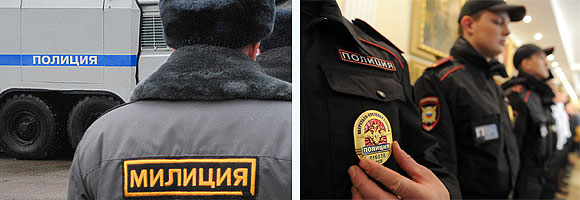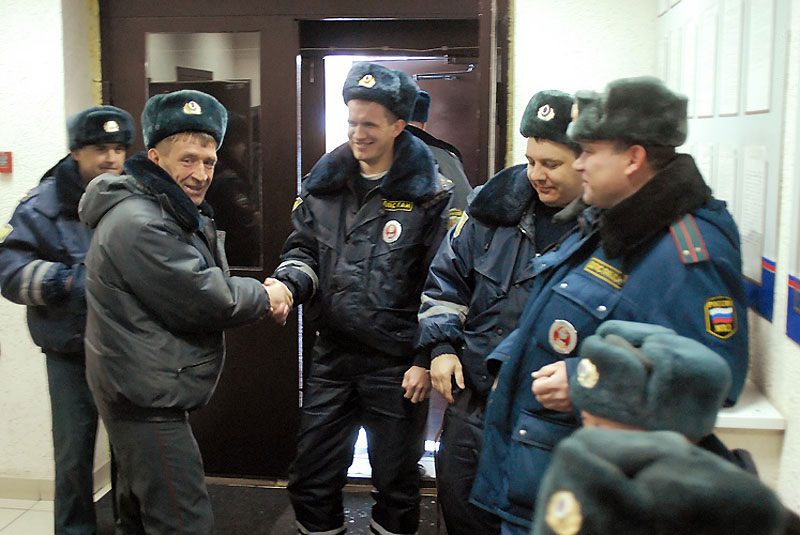On November 17th, 2012 the Institute of Modern Russian will hold a round table, entitled "No Boundaries in Russian Government Corruption", as a part of the 44th Annual Conference of the Association of the Slavic, Eastern European and Eurasian Studies (ASEEES). Today, we present an abridged version of the report by Sasha de Vogel, Сolumbia University MA Student, who will be one of the three round table participants.

By the time Dmitri Medvedev announced plans for a police reform law in December 2009, the need for change in law enforcement was urgent as evident from events like the supermarket shooting by Police Major Denis Yevsyukov, YouTube videos exposing institutionalized bribery by police officer Aleksei Dymovsky, and outrage at the detention and death of tax lawyer Sergei Magnitsky. President Medvedev promised to transform the Soviet hold-over militia with legislation that fit neatly with his modernization campaign. The prospect of police reform attracted so much interest that Medvedev posted the draft law online for public commentary; of 33,000 comments posted, 20,000 contained concrete suggestions for changes to the text. Similarly at the Duma, 560 amendments to the law were proposed before it was passed in an accelerated approval process in February 2011. By March, 2011, Federal Law FZ-3 of 7 February 2010, On the Police, was in effect.
This process could have produced a police law and police force that had the people’s support and trust, and was based on respect for the rule of law. Despite proposed comments and amendments, On the Police is so poorly drafted as to be ineffective, and so riddled with ambiguous language that it undermines the most basic principles of the reform itself. The comments that addressed the drafting issues were ignored, and none of the articles was edited in response to the online comments, though several new ones were added. At the Duma, almost all of the 560 amendments were dropped days before the vote, although voting support for the law had been secured based on promises that issues with oversight and vague wording would be amended, leading several members who felt “cheated” to withdraw support for the bill.
Though there are many obstacles to the modernization of Russian law enforcement, this law may well be the most significant. Rather than providing a legal framework for modernization, poor drafting protects the essential functions and power structures of the militia, fails to provide incentives for reform among officers and does nothing to affirm accountability or transparency.
The flaws in On the Police suggest that politicians at the highest levels have a vested interest in preserving the troubled structure and culture of law enforcement in Russia.
A review by the Presidential Human Rights Council found 17 loopholes arising from the repeated use of subjective terms such as “inappropriate.” Such subjective wording gives officers excessive leeway in determining the legality of a situation. Elsewhere, the language is so imprecise that officers are compelled to make judicial evaluations. One article allows officers the right to confiscate citizens’ documents if they believe them to be fake; the article (Article 12.I.37) includes no instruction on how to assess the validity of documents, when they should be retained or returned. Epitomizing the law's imprecision, the new term “police” is never legally defined.
Similarly, many articles rely on additional legislation, both extant and not yet drafted, leaving critical procedures undefined. Article 26 states that special ranks of commanding police officers are appointed for life, but that “a police officer may be deprived of his special rank in accordance with procedures established by a federal law,” without specifying which federal law, or if it is one that currently exists.
These drafting issues undercut procedures that might otherwise make a real difference in the quality and behavior of Russia’s law enforcement. One of the most trumpeted measures in Medvedev’s reform was the staff review, intended to eliminate the most unfit or corrupt officers. All officers were to be subject to an unscheduled evaluation that reviewed their suitability according to the law’s new standards: an officer may have no criminal convictions, not be dependent on drugs or alcohol, and so on. The standards are a clear step forward; the review, less so. The criteria used in the review were not specified in the law or made public. It is not known, for instance, if physical fitness was weighted equally with bribe-taking. Of the 143 generals who left the Interior Ministry, official reports stated that only 21 of them failed the re-certification for reporting false income statements or other unspecified “discrediting reasons;” the remaining 122 departing generals retired voluntarily.

According to former Chief of the Financial and Economic Department of the Russian Ministry of Internal Affairs Svetlana Perova, “Nearly 500 million rubles will be spent on new signs for the buildings and official vehicles alone. Another billion will be spent on badges for the policemen (each one costs 800-1000 rubles).”
In March 2012 IMR published a comparative analysis of the police reform in Russia, Estonia and Georgia in an article "Is Russian Police Doomed? Lessons From Estonia and Georgia" by Prof. Ekaterina Mishina.
Also troubling is the fact that the law does not include plans for such evaluations to be repeated. Rather than providing for constant monitoring, officers are able to pass the recertification by behaving properly for the few months they are under review. The journal Bolshoi Gorod conducted several interviews with officers under review who admitted to laying low during their evaluation and making up the lost income later, demonstrating that a one-time review is only a one-time deterrent.
While some officers make up the difference with bribes, others prefer to moonlight by providing protection services, but On the Police does not prohibit officers from taking part in supplementary economic activities, despite potential conflicts of interest. Instead, the law forbids officers from engaging in actions “that can cause doubt as to their impartiality or compromise the authority of the police,” without specifying what types of actions give rise to such doubts, or how those doubts should be assessed (see Article 7). One of the proposed Duma amendments addressed this gap but it was dropped, suggesting that this vague language is deliberate.
Even the language on accountability—an essential aspect of a democratic, rights-oriented police force—is vague or absent. Article 33 (“The Liability of a Police Officer”) affirms that a police officer shall be held accountable for “wrongful actions […] as established by federal law,” but does not define “wrongful actions” nor the avenues for accountability. Article 53 allows for the actions of a police officer to be challenged in court or by appeal to higher officials. These two articles encompass the full extent of the law's language on individual accountability. Notably absent is a provision whereby data on accountability, like the frequency and types of violations, would be made public.
Though not mentioned in the law, the Internal Security Department of the Ministry of Internal Affairs, the Procuracy and the Federal Service of Security all have jurisdiction to investigate violations by law enforcement officers. Yet this system is redundant, convoluted and even contradictory, insofar as the Internal Security Department is also responsible for protecting and enhancing officers’ rights. The Public Chamber, public councils of law enforcement agencies and a monitoring committee are granted the rights in Article 50 to exercise “public control” over the police, but the nature of this control is not defined. In any case, none of these organizations is open to public participation.
It is not clear how the organizations exercising public control are meant to work with organizations representing judicial control and state control (Articles 51 and 49, respectively), or how they are meant to engage with the Procuracy, which provides “supervision” (Article 52). The law does nothing to align this constellation of oversight, control and supervisory bodies into a comprehensive system for monitoring and regulating the police force.
Regarding regular police activity, the law also fails to guarantee access to information essential for the public, the media and legal organizations to assess police behavior. Article 8.3 asserts that the police will inform the government and public about its activities, but the frequency (“at least once a year”) and content of these reports will be defined by the Ministry of Internal Affairs. In view of the decades-long practice of manipulating crime statistics in order to present the police force and crime rate in a more positive light, it would have been beneficial to provide for the involvement of external observers and analysts, and to require that the reports be issued at certain intervals and include prescribed content.
Still, the law states (see Article 9.6 ) that “public opinion is one of the basic criteria of official assessment of the activities of the police." The evaluation of public opinion is entrusted to a branch of the Ministry of Internal Affairs, which will also monitor interactions with civil society organizations. Giving priority to public opinion is consistent with the goal of law enforcement legitimation, but allowing the Ministry of Internal Affairs—of which the police is a part—to conduct unobserved monitoring of the most important metric for evaluating the success of the reforms, without specifying their methods in the law, is misguided. However, police evaluation of public opinion of its actions is unlikely to be fair. After all, “no police force in the world seeks to change itself,” as Anneke Osse of Amnesty International has observed.
Institutionalized accountability binds the police to the rule of law. By failing to affirm accountability, the law does nothing to refute the widespread view that police are above the law. Likewise, transparency ensures that the police work in the service of the public and permits verifying that they are effectively providing security. The omission of these principles not only jeopardizes the efficacy of the law in changing the behavior of the police, but by denying the public key forms of oversight, ensures citizens will remain or become increasingly distrustful of law enforcement.
The fact that the new term 'police' is never legally defined in the new law is quite symbolic.
The law is more than a failed opportunity to legitimate law enforcement; it demonstrates the Russian government's resistance to true reform the police. These problems deal with the text of the law—its very heart—not with its application, where cultural, economic, human and any number of factors could easily jeopardized its impact. These flaws confirm the perception that law enforcement and the state are engaged in a mutually beneficial relationship that supports their interests over those of the public. It suggests that the highest-level politicians have a vested interest in preserving the troubled structure and culture of law enforcement in Russia, and further erodes public faith in the administration’s ability to accomplish legal reform.
After all, Medvedev is a lawyer by training; surely he would have noticed the drafting issues in his celebrated pet project, even if they had not been pointed out by the public and in the Duma. When discussing the popularly supported suggestion that detainees be read Miranda-style rights, Medvedev betrayed a pragmatic attitude: “Let it be. It would not create too much trouble for a policeman and it won’t harm a detainee to hear [one’s rights] once again.” Rightly observed: the law is unlikely to create too much trouble for a policeman.











